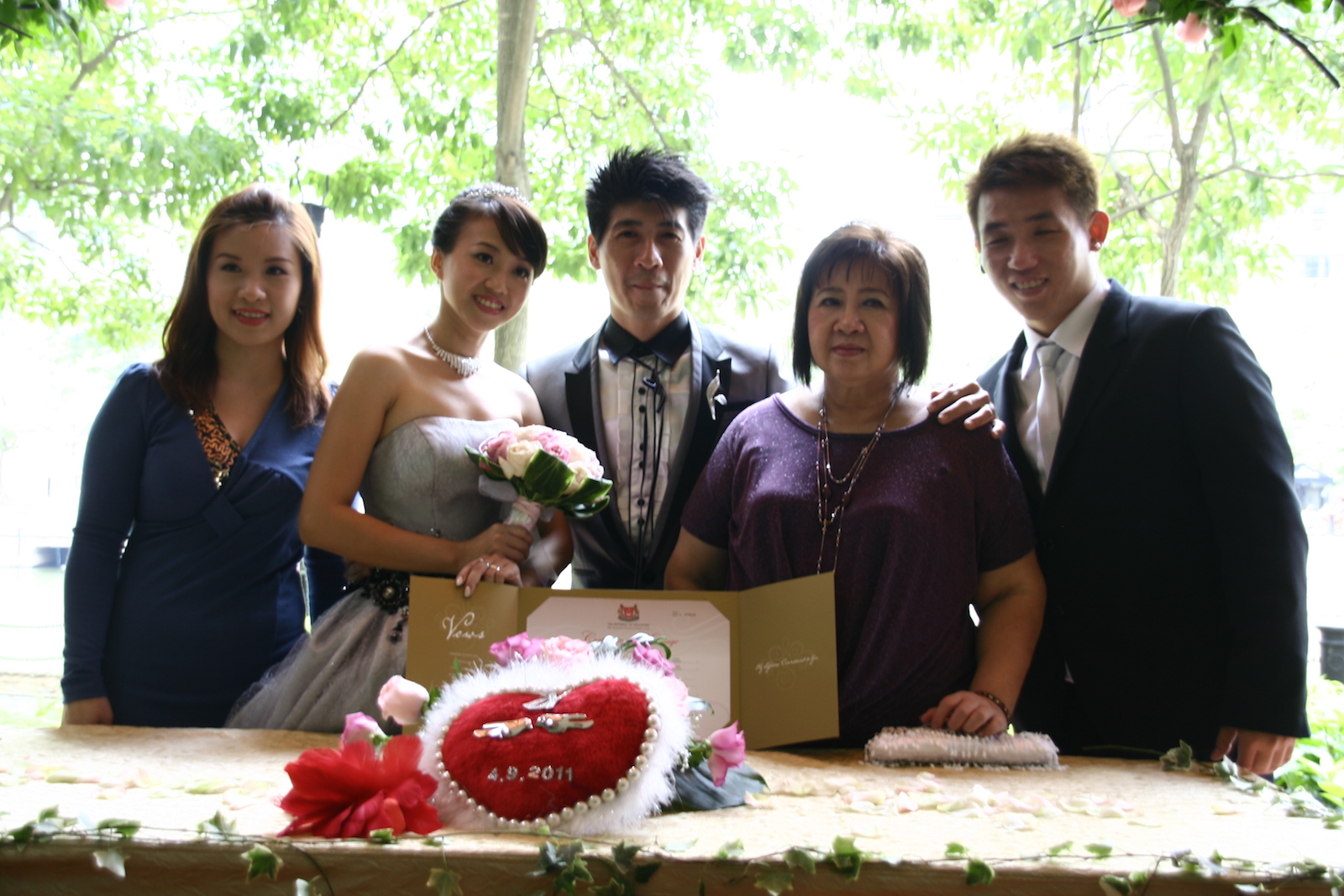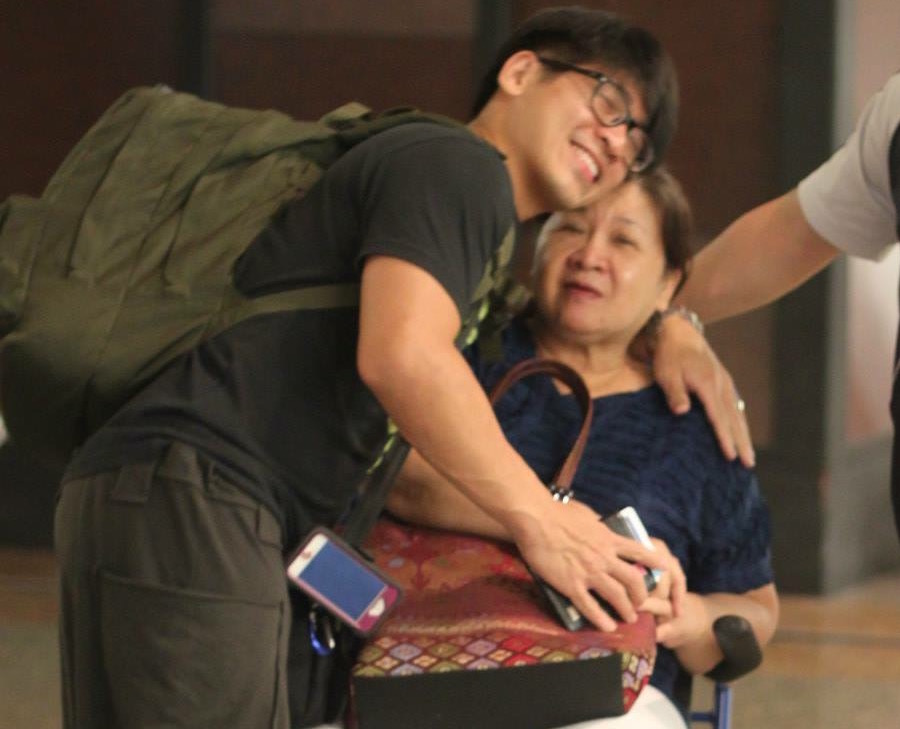At age 36, Derek Seong found out his mother had early-stage breast cancer. Barely two months later, she was gone, but not because of the cancer. We had a chat with the now 39-year-old, still grieving Artistic Director to find out what went wrong with his mother’s treatment process and how he managed to make it through those difficult days.
“Not even the doctors, whom we trusted, were able to provide us with a good reason for how and why my mum suddenly got infected by a virus and died within 48 hours of being admitted to hospital.”Q: Hi Derek, thanks for coming on to share your story. You said your mum had cancer before she died? What form of cancer did she have? Can you tell us what you know about it now?
A: My mother was diagnosed with early-stage cancer after an ultrasound scan and biopsy had been done on her right breast. Confirmation of Stage 1 cancer on her right breast was made after a CT Scan and nuclear x-ray.
How did your mum discover she had cancer? Were there any signs and symptoms of the disease beforehand?
She felt uncomfortable and had small lumps around her breast area. There wasn’t much pain, just discomfort.
How did your mum decide which treatment options to go with? What part did you or the rest of your family play in those decisions?
There wasn’t much hesitation. We prayed for it not to be breast cancer and sought an appointment with the hospital straight away for a check-up. We often meet for family dinners so my siblings and I recommended she go straight for a check-up.
Did the treatments work? Which form of treatment worked the best, and which didn’t work?
Removal of her right breast was done at Khoo Teck Puat Hospital by Dr Germaine Xu. Further tests showed no spread of cancer cells to lymph or other body parts. The only treatment which turned out to be fatal was the side effect of chemotherapy.
What was your routine like when your mum was battling cancer?
It was during the CNY [Chinese New Year] period. But we took it positively, knowing that the cancer was only at an early stage. My wife was expecting twins, hence I had to juggle my schedule between work, mum’s appointments, wife’s appointments and others. It was tough, but I managed to handle it.

What was your routine in the weeks following her demise?
It was madness. My jobs require me to smile and provide entertainment to commercial clients. When I’m teaching, I have to maintain the right attitude. I had no time to be upset and I really needed to stay as and be the pillar of the family. And my wife was days to being due.
How did you spend your weekends when she was still battling cancer, and later in the weeks after she passed on?
I spent 8-12 hours teaching and doing rehearsals during the weekends. I was usually around, with my mum, during weekdays and at dinner time during the weekends. [Later on,] I was busy with clearing and packing my mum’s stuff. At the same time, setting up my baby room and busy with preparing to receive my twins. The mix of emotions almost got me crazy.
How long after her death was it before you felt like you were able to function ‘normally’ again?
I’m still not functioning normally. I doubt I will ever be.
How long after her death was it before you felt like you were no longer grieving or intensely sad about her passing?
I am still grieving. It was only recently that I’m not that intensely sad. My mum’s case is still not justified. I can’t be peaceful till then.

What advice do you have for people whose parents have been diagnosed with cancer?
Seek the best, correct method of treatment. Have a proper discussion, research and seek proper advice from experts and families who have gone through those processes. One should have several considerations before seeking “Doctors” for treatment. Some parents may be too old to handle treatment. Might as well let them enjoy themselves and fulfil the dreams they always desired for.
Can you map out a recommended path for people whose parents have only just been diagnosed with cancer to follow?
1 – Identify the illness and do your own research.
2 – Seek advice from friends/relatives who have good knowledge about that particular cancer before going straight to doctors.
3 – Take into consideration the age of your parents. Can they handle the medicines, side effects, etc?
4 – Always listen to a second opinion and do not be embarrassed about asking questions. It’s the life of your parents we are talking about.
5 – Seeking treatments, or not, from a hospital is as good as taking a gamble. Take calculated risk. Choose the lower risk.
What are the key things/people/situations that enabled you to get through the uncertainties and difficulties during your mum’s fight with cancer, in your opinion?
The bonding of our family and the support from my friends, wife and even my clients. I consider myself “lucky” in the sense that through my years of hardship growing up, I had become a very strong-minded person who wouldn’t submit to defeats and failure easily. I pick myself up without the need for encouragement by others.
Secondly, I’m the eldest son. Not the eldest child but being the man of the house, I ought to be strong and be able to provide encouragement and strength for my family.
How did seeing what your mum went through and losing her at the end of it all change you as a person? Or did it not change you? Why?
My mum’s departure was very sudden. Not even the doctors, whom we trusted, were able to provide us with a good reason for how and why my mum suddenly got infected by a virus and died within 48 hours of being admitted to hospital. Her initial report stated death due to unnatural causes. We are still having a case with the hospital by the way.
And with these, her departure was a big blow to me and my family. All these years, I had been working so hard to provide her with a good, relaxing life. She was the reason why I had been constantly improving. I don’t have much friends to share my thoughts; besides my wife, she was my next listening ear. I would call and chat with her in between all my breaks or while I was driving.
I felt like an orphan, lost and lonely (my father left us for another family long, long ago), thinking ‘what should I do then’ and ‘why do I still need to work hard’? But of course, I still have many reasons to continue fighting. I have my wife, my twins and my siblings to take care of.
I have become even stronger than before and value family bonding even more, which [I have expressed], over the years, through doing talks, shows and conducting classes with youngsters about cancer awareness and the importance of having good family relationships.

If you could go back and replay the time you had with your mum all over again, what would you do differently?
With regards to myself, I would have made sure I never made her worried. I would rather earn lesser money but spend all my time with her. Even though we were always together, I still feel it hadn’t been enough. And I will not have sent her for chemotherapy.
I want to see her grow old, with white hair, and I want to feed her when she can’t [feed herself] and I want to carry her when she can’t walk. Like what she did for me when I was a child.
What was your mum’s role in your life when you were a child? What about when you were a teenager and later a young adult? How did her role in your life change at every decade? Or did it not change?
She was my everything. I loved her from a young age. Although we were very poor, I never felt sad. I was happy and I felt that I had more than what I deserved.
My father is a very bad person. She had to take care of the five of us all by herself. Her life was miserable—she was adopted and she worked very hard to feed us and nurture us because our father didn’t care, and even beat her. Yet my mum was very forgiving—always reminding us not to hate our father.
She’s my angel, the kindest soul, and she is a person I wouldn’t do anything to hurt. [Because of her], I told myself to be a good person, kind and be helpful to others. She never stopped me from doing anything I liked. All these factors resulted in my success, the stories I have to tell and my character. Without my mum, I’m nothing.
Which major event in your mum’s life made her who she is, in your opinion? Why do you think so?
Maybe because she was not given much from a young age, she was happy with all that she earned and she was happy to share what she had with others. Because she had little, she valued everything, [and always] remembered and appreciated all those who aided her. And of course, having an useless husband, she had to be strong.
Which 3 objects/people in your life can you presently not live without and why?
My siblings. My wife and kids. My students. They are the only reasons I have now to work and stay alive.
Of all the objects you bought when caring for your mum when she was dealing with cancer, which was the most useful? Why?
I wouldn’t consider it a ‘bought’; it was more of guiding her to use the voice record [function on her phone], [teaching her to] take videos to share, use Facetime and [engage in] gaming—which brought her closer to her grandchildren. And she was happy seeing us via Facetime instead of [merely as] voices when we were not with her.
My wife even taught her Facebook, which she became a big fan of and started making/finding friends.

Which person do you wish LUCK-IT would interview for you to learn from? Why?
Those doctors who are responsible for her death and someone who can seek justice for us.
Lastly, what is the worst advice you’ve been given, or have heard people giving, with regards to cancer? And what’s the best?
The worst advice I was given was telling people to trust doctors “completely”. The best was to seek different opinions first before jumping into conclusions.
Derek is presently constantly busy with teaching at the dance company he is Artistic Director of, and also with all aspects of the new events company he has only just started. You may chat with him about the above topic using the comment box below, or by reaching out to him on his website, www.dancescapesg.weebly.com.
Photographs courtesy and copyright of Derek Seong. Interviewer: Sy
If you found this article useful:

Say something: